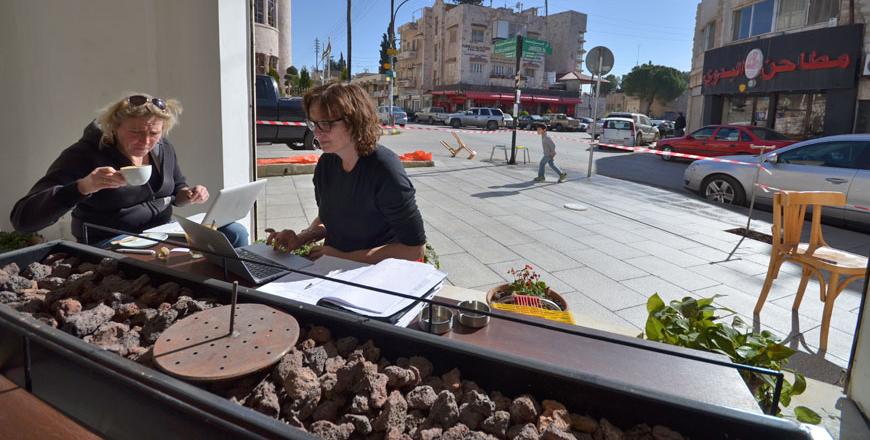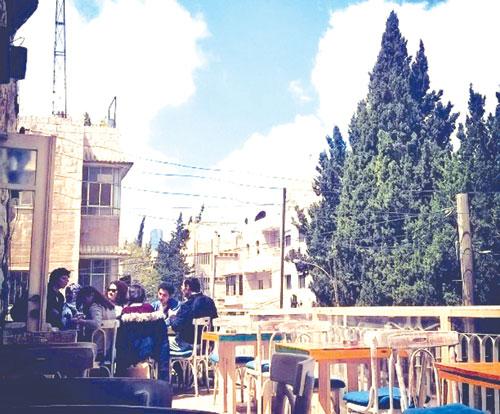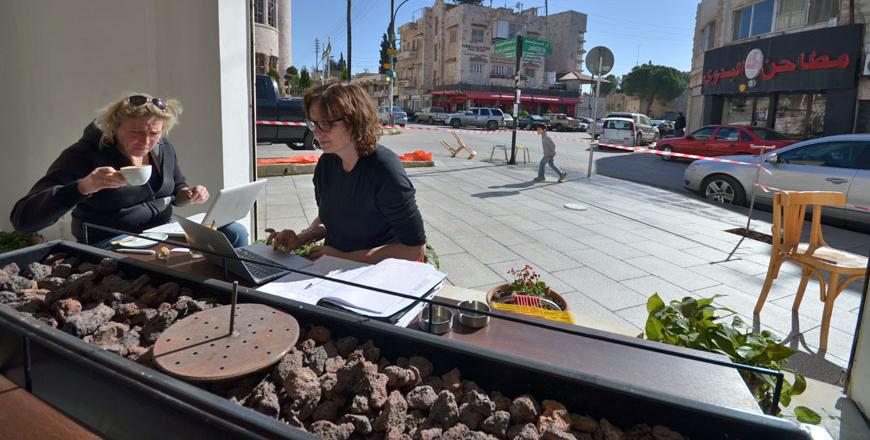You are here
Jabal Luweibdeh residents worried old neighbourhood is losing lustre
By Muath Freij - Jan 14,2016 - Last updated at Jan 14,2016

Two foreigners work on their laptops in Rumi Café in Jabal Luweibdeh, Amman, Wednesday (Photo by Muath Freij)
AMMAN — Zaki Ammareen, a lifelong resident of Jabal Luweibdeh, says he no longer feels the "nice and calm" atmosphere he used to enjoy in the area when he was a child.
Ammareen was born in the old neighbourhood 75 years ago, and its "former beauty and his fond memories of it encouraged him to stay; getting married and living there at his family's house.
"In the past, there were very few restaurants and cafés on Baouniah Street. But over the past three years, so many liquor stores, restaurants and cafés have opened on this narrow, one-way street," he told The Jordan Times.
The increasing presence of these commercial venues has made life difficult, due to the noise and limited parking spaces, according to Ammareen.
Many of the neighbourhood's old residents share the same complaint, and they are worried that the "beauty and uniqueness" of their locality might "go with the wind".
Omar Faouri, the mukhtar (unpaid community leader) of Jabal Luweibdeh, said the Greater Amman Municipality (GAM) should have licensed businesses other than cafés in the area.
"They should have licensed shops where clients do not stay for long," he told The Jordan Times at his store in Jabal Luweibdeh.
Hayat Al Naser, president of the Friends of Luweibdeh Cultural Association (FLCA), noted that these cafés spill over onto the pavements, which makes it difficult for pedestrians to walk.
Saleem Quna, a FLCA member and former president of the association, said he does not want to see what happened in Jabal Amman and Rainbow Street — in terms of commercialisation and "loss of heritage" — repeated in Jabal Luweibdeh.
“It will destroy the cultural soul of the area. Jabal Luweibdeh has managed to maintain its image because most of its residents still live here unlike Jabal Amman, whose residents are high-class families who moved to new neighbourhoods,” he told The Jordan Times.
According to Quna, around 10 houses have either been transformed into or are about to become restaurants.
Faouri said Amman Mayor Aqel Biltaji has already prohibited demolishing houses of heritage significance and called for renovating them in accordance with regulations.
“But they have not prevented people from transforming houses into commercial investments. We want these orders to be enshrined under a law,” he added.
The increasing number of cafés causes traffic jams in an area that already suffers from limited parking spaces, Quna said.
GAM Spokesperson Izz Eddein Shammout said the municipality has banned the establishment of new residential building in the neighbourhood to preserve its “beauty and heritage”.
“We care about the identity of the capital. There is a club affiliated with GAM in Jabal Luweibdeh and we are thinking of making it a parking lot that accommodates around 600 vehicles,” he added.
Shima Tal, another FLCA member, called for turning abandoned houses into cultural centres.
Ayman Taqatqa, the owner of Rumi Café in Jabal Luweibdeh, said he does not see any problem in opening a café, as it benefits residents.
“Sixty per cent of my customers are from the neighbourhood. Also, I made sure that my café is in harmony with the soul of the area and this adds more beauty to it,” he said.
Faouri called on GAM to conduct a feasibility study before granting licences to new businesses.
“They should first double-check if the location is suitable and has parking spaces.”
Despite the transformation that he feels has already affected the aesthetics of Jabal Luweibdeh, Ammareen insisted he will not move to another neighbourhood.
“All my memories are here. I know every nook and cranny like the back of my hand. Whatever happens in the future, I will never leave.”
Related Articles
The Greater Amman Municipality (GAM) has submitted an official letter to the government requesting its approval of a decision to enforce a fixed closing time for cafés, night clubs, carpentry shops and other places licensed as commercial outlets in residential areas.
AMMAN — The Greater Amman Municipality (GAM) on Thursday stressed that pavements are for pedestrians, not for shopkeepers to display their g
AMMAN — The Greater Amman Municipality (GAM) is planning on renovating, yet preserving, Jabal Luweibdeh in 2019, according to a report made

















